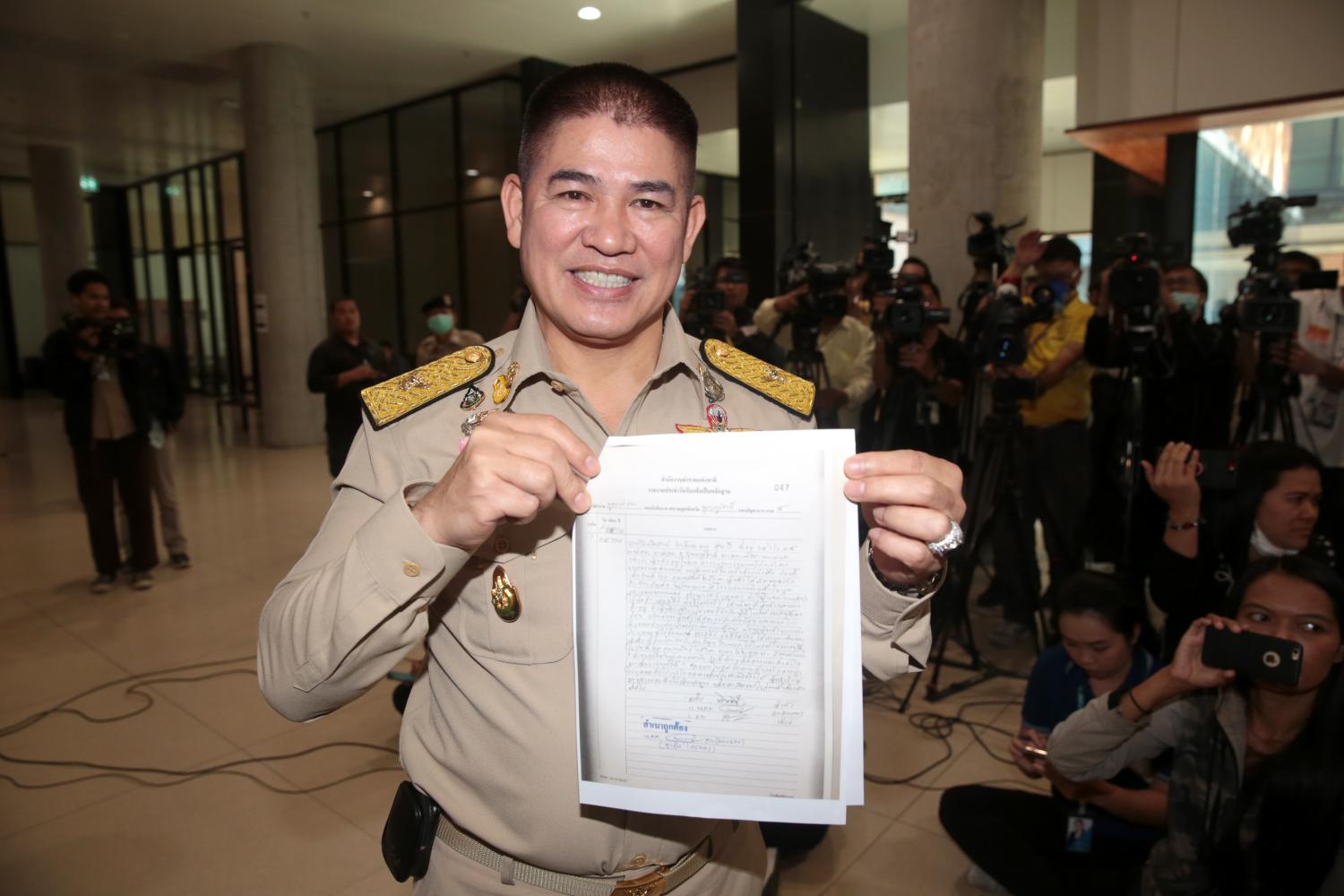Chadchart Sittipunt's win in last Sunday's governor election may not have surprised people as much as how many votes he finally received.

Chadchart: Sets new vote record
He bagged more than 1.3 million, elevating him to top spot with the most votes a governor election victor has collected since records began in 1989.
It had been predicted that insatiable thirst for the capital's governor election would tip the scales of power at City Hall and indeed serve as an indicator as to how the next general election, expected late this year or early next year, might shape up.
Bangkok had not held a governor election for nine years. One would have been held sooner if the National Council for Peace and Order-engineered coup had not put the governor race on the backburner fearing it would have stirred social and political unrest.
Observers noted it was natural that when candidacy registration finally opened, several people, many with exceptional credentials and solid political backgrounds, threw their names in the hat.
Mr Chadchart was the first to declare himself ready to run, well before other candidates. His preparedness, calibre as an executive in the private sector and a former transport minister during the Yingluck Shinawatra administration and strength of character were attributed as factors in Sunday's poll triumph.
However, strategic votes may have been the name of the game, played by both the so-called "pro-democracy" camp and the side supporting the government
The "pro-democracy" voters were thought to have backed Mr Chadchart and Wiroj Lakkhanaadisorn, who represented the opposition Move Forward Party (MFP), while the other side favoured Democrat Party candidate Suchatvee Suwansawat and independent candidates, the former Bangkok governor Aswin Kwanmuang and former deputy Bangkok governor Sakoltee Phattiyakul.
Mr Chadchart's overwhelming victory was a culmination of "strategic votes", according to fugitive former premier Thaksin Shinawatra.
He said voters had wanted to vote for the candidate of the MFP, the second-largest opposition party, but decided instead to cast their ballots for Mr Chadchart who they thought had a better chance of winning.
The votes for Mr Chadchart were not manufactured, he said. Rather, voters were enticed to back the independent candidate in the same way pro-government voters were urged to vote strategically for candidates on their side of the divide, Thaksin noted.
In other words, MFP supporters dreaded the prospect of anyone other than either Mr Chadchart or Mr Wiroj winning so they decided to vote for Mr Chadchart hoping for a decisive win. They were also encouraged by opinion surveys which had consistently forecast a comfortable electoral victory for Mr Chadchart.
The observers said if Thaksin's theory about strategic votes was true, it may have spoken of MFP supporters' lack of confidence in Mr Wiroj winning.
In an interview on a political talk show, Suriyasai Katasila, dean at Rangsit University's College of Social Innovation, and a former coordinator of the yellow-shirt People's Alliance for Democracy questioned Thaksin's observation, saying it might not add up.
In the last general election in 2019, the Future Forward Party, which was later dissolved over its leader Thanathorn Juangroongruangkit's loan to the party and reborn into the MFP, won about 800,000 votes in Bangkok. But in Sunday's poll, Mr Wiroj came third with 253,938 votes or 9.5% of the vote.
Based on these figures, Thaksin's theory about Mr Chadchart's win should suggest that more than half a million votes from MFP supporters went to Mr Chadchart. According to Mr Suriyasai, this may sound a little too far-fetched.
The political scientist believed that even if strategic votes had come into play, they did not make a significant impact on the poll result.
He insisted that for strategic voting to work, an election must be a two-horse race. The vote for either candidate would be unified and therefore deliver a punch. But in Sunday's poll, there were simply too many candidates to choose from, especially on the pro-government side.
During the campaign trail, the pro-government bloc had been split over whom its supporters should cast their ballots for.
On the other hand, Mr Suriyasai said if Mr Chadchart had run under Pheu Thai's ticket or Pheu Thai had backed a candidate other than Mr Chadchart, chances are Mr Chadchart would have been unlikely to have passed the 1.3 million vote mark.
A cat's among the pigeons
Aplanned no-confidence debate against Prime Minister Prayut Chan-o-cha has become much more interesting after the latest developments in the Setthakij Thai Party, observers say.

Thamanat: May side with opposition
The party is home to 18 former Palang Pracharath Party (PPRP) MPs led by Capt Thamanat Prompow who were expelled from the ruling party for demanding changes to the party's executive line-up.
Their departure is said to have weakened the coalition government. But because two Setthakij Thai heavyweights -- Gen Wit Devahastin na Ayudhya as leader and Capt Thamanat as secretary-general -- are known to be close aides of Deputy Prime Minister and PPRP leader Gen Prawit Wongsuwon, the party is viewed as an ally the government can count on.
However, observers are not so sure about where Setthakij Thai's loyalties lie after Tuesday's events when 15 party executives, out of a total of 22, including Capt Thamanat, resigned en masse.
It meant the dissolution of the party's executive board and the purge of Gen Wit as party leader.
Prior to this, rumours of discord between Gen Wit and Capt Thamanat were making the rounds. It was said to centre around Capt Thamanat's tense relationship with Gen Prayut and the possibility that he might try to challenge the premier again.
Last September, Capt Thamanat was accused of plotting to overthrow Gen Prayut in a censure debate by rounding up some PPRP renegade MPs and lawmakers from small parties and getting them to vote against the prime minister. However, Gen Prayut survived the debate.
On Monday Gen Wit was quoted as saying that he had thought about quitting as party leader. The very next day as he said he had decided to stay on and talk things out with Capt Thamanat, he was confronted by the mass resignation.
To observers, this is a clear and strong sign that Capt Thamanat is ready to break free from Gen Prawit.
It is widely believed that Capt Thamanat will be elected Setthakij Thai Party leader and gain total control of the party at a general meeting for the selection of new executive board scheduled for June 7.
Capt Thamanat also announced his readiness to assume the party leadership amid reports that he had wanted to lead Setthakij Thai when his faction was ousted, but bowed to Gen Prawit's wish that Gen Wit head up the party.
Capt Thamanat's bid to take over Setthakij Thai appears to coincide with the upcoming censure debate.
The opposition led by the Pheu Thai Party is gearing up to table a fresh no-confidence motion against Gen Prayut and his administration over its handling of the economy, soaring prices and the Covid-19 pandemic.
Since the 2019 election, Gen Prayut has survived three no-confidence votes and his closet call was the previous one in September last year.
Despite Capt Thamanat having denied the accusation he betrayed Gen Prayut, the prime minister proceeded to sack him as deputy agriculture and cooperatives minister. Political turbulence ensued in the PPRP, which culminated in Capt Thamanat's expulsion from the ruling party.
There are whispers that Setthakij Thai may side with the opposition in the next censure debate expected sometime next month or in July. Capt Thamanat has reportedly been in talks with key figures in Pheu Thai lately.
According to a highly placed source, Capt Thamanat has "struck a deal" with fugitive prime minister Thaksin Shinawatra, alleged de facto leader of the party.
If Capt Thamanat switches sides, there might be enough censure votes to topple the prime minister in the censure debate due to his growing political clout.
Capt Thamanat has befriended and reportedly lured into his fold five micro coalition parties and some are even considering merging with Setthakij Thai to improve their chances in the next general election.
Gen Prawit will have no choice but to hold talks with Capt Thamanat or Gen Prayut will face one of the toughest challenges to his premiership when the debate takes place, according to observers.
As for Gen Prayut, July appears to be his crucial month. Besides the censure motion, Pheu Thai plans to ask the Constitutional Court to rule if his eight-year tenure ends in August this year.
Gen Prayut's term is currently disputed because no one can agree on when he actually took office.